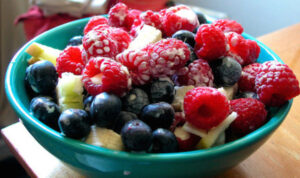Healthy Food Facts or Fiction? 4 Food Conflicts Resolved

Apart from the healthy food facts we often ponder, there are many other questions, like when and how to eat. Here are four common healthy food facts that are often clouded in fiction.
1. Eat Breakfast or Skip Breakfast?
This particular debacle bothers me. I think the question of whether breakfast is crucial or not is rooted in the highly advertised concept of late that chimes, “breakfast is the most important meal of the day.” Au contraire! Sure, this may be true for some people. For others, maybe not.
Here’s the thing. Breakfast is a ritual, just like every other meal is. We’ve been domesticated to believe that we have to eat three meals per day and we have stuck to it for, well, as long as anyone can remember. What gets lost in this, however, is what your body actually requires. Perhaps two meals a day are enough. Perhaps just one is enough. Perhaps you need six smaller meals.
With that said, your body may be used to breakfast. It expects oatmeal around 8 a.m., so it starts to growl around 7:45 a.m. Your body is asking for it. But, intellectually knowing that breakfast is the so-called “most important meal of the day: may cause you to eat more than your body needs or wants or giving yourself leeway to eat unhealthy options. Designating value to breakfast manipulates your actions and causes you to force upon your body something that may not be necessarily required.
That’s why I don’t like when the importance of breakfast is proclaimed in a sweeping fashion and put on a pedestal. What we should all be doing is eating the first meal of the day when our body asks for it, when we actually feel hungry. This can be at 7 a.m. or alternatively, at 3 p.m. Listen and learn.
2. No Fat or Fat?
The low-fat craze of the ’90s left us all fearing fat. Unfortunately, this was not for good reason. The truth is, not all fats are created equal. If it weren’t obvious already, regularly indulging in fried foods and more-than-generous servings of animal-based fat isn’t going to keep your body slim. This goes for carbohydrates and protein too – too much of anything is simply bad. But a moderate amount is necessary to survive.
Did you know your brain is nearly 60 percent fat? Knowing this, can you guess what a no-fat, or devastatingly low-fat, lifestyle will do to your psyche? It’ll alter brain functions in some pretty significant ways. Furthermore, nixing fat means you are more likely to depend on sugar and refined carbs, which are not worthy substitutions.
Normal brain function is dependent on the consumption of healthy fats. Ah, there’s the clincher: healthy fats. Without going extreme on fat consumption – keep it balanced – reach for foods rich in omega-3 fatty acids, HDL (good) cholesterol and monounsaturated and polyunsaturated fats. If you eat fat, focus on the sources your body recognizes. These foods include, olive oil, avocados, olives, nuts, flax seeds and fatty fish, among others. Limit saturated fats and trans fats, which are found in high-fat cuts of meat, chicken with the skin, whole-fat dairy products, cheese, lard, commercially baked pastries and cookies, packaged snack foods, margarine, vegetable shortening, fried foods and candy bars.
3. Eat Dinner Late or Eat Dinner Early?
It’s true: calories know no time. They are assimilated the same in the morning and the night. However, while you sleep, your body slows down, including digestive processes. You digest, only slower. Eating late can be uncomfortable for you while you sleep and the food can continue being processed in your stomach well into the next morning. If you eat earlier, chances are you will engage in more physical activity afterwards than if you eat later. That allows you to fall asleep more comfortably, rather than with a full stomach, and it will also jump start your digestion.
But if you do eat a late dinner, rest assured that when you wake up and start moving, your body will burn off the calories you ate the night before. If you eat a heavy meal later in the night and sleep shortly after, when you arise the next day, wait a few hours before your first meal, allowing your body to continue to fully digest the meal from the night before. You don’t want to create a traffic jam of undigested food in your system. In other words, digest one meal before you introduce another.
On the other end of the spectrum, avoid eating your latest meal too early if you know that you will get the munchies later and potentially reach for less-than-stellar snacks or junk food.
4. Fruit or No Fruit?
Fruit is the most perfect food offered by Mother Nature. However, that doesn’t mean it is fit for all of us. If you are prone to candida, or yeast-related symptoms, anything sugary should be avoided until the problem is resolved. Even though fruit contains natural sugars, these sugars are still just that: sugars. Instead of feeding the yeast, starve it by avoiding fruits, starches and syrups.
To test whether you are candida prone, check your belly after a piece of fruit. If you bloat and then have a bowel movement shortly thereafter or stay regular and de-bloat shortly, chances are your body can handle fruit. If you bloat and stay bloated, then you may want to avoid fruit until you resolve candida issues. Women are more prone to candida than men.
Related on Organic Authority
Why Eating Before Bed is Messing With Your Mood
What You Eat May Hurt Your Sleep
Breakfast Pizza Recipe: G’Mornin to You!
Photo Credit: JoJomzz

